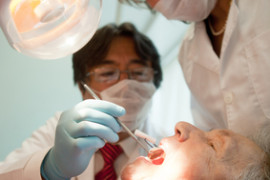Many studies have found a relationship between periodontal disease and various types of cancers throughout the body. However, a new study in Tumor Biology is the first to assert that a prolonged oral infection might make oral cancer worse.
For the study, researchers infected oral squamous cell carcinoma cells with Porphyromonas gingivalis, a major pathogen of chronic periodontitis, over the course of five weeks. They found that this persistent P. gingivalis infection resulted in significant changes to the cancer cells’ shape, a decreased expression of specific cell markers, and an increase in cancer stem cell markers. It also promoted the tumorigenic properties of the cancer cells.
Perhaps the most alarming outcome, however, is that the continuous exposure to P. gingivalis also promoted the “migratory and invasive” properties of oral squamous cell carcinoma, all the while increasing the cells’ abilities to resist chemotherapy.
Over 45,000 Americans are diagnosed with oral/pharyngeal cancers every year, and around 90% of oral cancers are squamous cell carcinomas. That this deadly form of cancer has been so inexorably linked with one of the most common and most virulent pathogens that cause periodontal disease makes this study highly significant.
A large portion of the population is walking around with a high bioburden of P. gingivalis as we speak. Many of these people do not have visual signs of periodontal disease. The outcome of this groundbreaking study shows us that a key component of oral cancer prevention and treatment lies in examining and addressing oral health on a microbial level.



